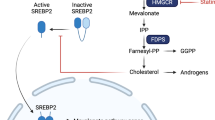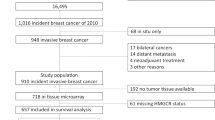Abstract
Statins are popular lipid-lowering drugs that have had a great impact on the primary and secondary prevention of cardiovascular diseases. Basic and clinical research have also revealed that statins have biologic activities that go beyond lipid lowering, and suggest that they might have other therapeutic benefits. Perhaps the most exciting of these additional biologic effects is the finding that statins can exert an anticancer effect on cultured cancer cells, and in animal models. Clinical studies of statins for the treatment and prevention of cancer have, however, produced conflicting results. This review critically evaluates the current body of literature on the role of statins in the treatment and prevention of gastrointestinal cancers, with particular focus on clinical and observational studies.
Key Points
-
Statins are widely-used lipid-lowering agents with a well-defined role in the primary and secondary prevention of cardiovascular diseases
-
Basic and clinical research suggest that statins might have a role in the treatment and prevention of gastrointestinal cancers
-
Existing clinical data on the use of statins for the treatment of gastrointestinal cancers are discouraging
-
Analyses of cancer incidence in previous, short-term randomized controlled trials of statins for primary cardiovascular endpoints are not well suited to address the role of statins in cancer chemoprevention
-
Observational data on statins in the chemoprevention of gastrointestinal cancers are encouraging but far from conclusive
-
At this point in time, statins cannot be recommended for the purpose of cancer prevention
This is a preview of subscription content, access via your institution
Access options
Subscribe to this journal
Receive 12 print issues and online access
$209.00 per year
only $17.42 per issue
Buy this article
- Purchase on Springer Link
- Instant access to full article PDF
Prices may be subject to local taxes which are calculated during checkout


Similar content being viewed by others
References
Cheung BM et al. (2004) Meta-analysis of large randomized controlled trials to evaluate the impact of statins on cardiovascular outcomes. Br J Clin Pharmacol 57: 640–651
Baigent C et al. (2005) Efficacy and safety of cholesterol-lowering treatment: prospective meta-analysis of data from 90,056 participants in 14 randomised trials of statins. Lancet 366: 1267–1278
Verispan VONA (2005) Top 200 brand-name drugs by units in 2004. Drug Topics 149: 25
Verispan VONA (2005) Top 200 generic drugs by units in 2004. Drug Topics 149: 26
Zielinski SL (2005) Following positive epidemiologic studies, statins to enter clinical trials for cancer prevention. J Natl Cancer Inst 97: 1172–1173
Oliver MF (1991) Might treatment of hypercholesterolaemia increase non-cardiac mortality? Lancet 337: 1529–1531
Stamm JA and Ornstein DL (2005) The role of statins in cancer prevention and treatment. Oncology (Williston Park) 19: 739–750
Demierre MF et al. (2005) Statins and cancer prevention. Nat Rev Cancer 5: 930–942
Bocci G et al. (2005) Fluvastatin synergistically enhances the antiproliferative effect of gemcitabine in human pancreatic cancer MIAPaCa-2 cells. Br J Cancer 93: 319–330
Agarwal B et al. (2002) Mechanism of lovastatin-induced apoptosis in intestinal epithelial cells. Carcinogenesis 23: 521–528
Vasudevan AR et al. (2005) Safety of statins: effects on muscle and the liver. Cleve Clin J Med 72: 990–993, 996–1001
Phillips PS et al. (2002) Statin-associated myopathy with normal creatine kinase levels. Ann Intern Med 137: 581–585
de Denus S et al. (2004) Statins and liver toxicity: a meta-analysis. Pharmacotherapy 24: 584–591
Sniderman AD (2004) Is there value in liver function test and creatine phosphokinase monitoring with statin use? Am J Cardiol 94: 30F–34F
Vijan S and Hayward RA (2004) Pharmacologic lipid-lowering therapy in type 2 diabetes mellitus: background paper for the American College of Physicians. Ann Intern Med 140: 650–658
Thibault A et al. (1996) Phase I study of lovastatin, an inhibitor of the mevalonate pathway, in patients with cancer. Clin Cancer Res 2: 483–491
Larner J et al. (1998) A phase I–II trial of lovastatin for anaplastic astrocytoma and glioblastoma multiforme. Am J Clin Oncol 21: 579–583
Kawata S et al. (2001) Effect of pravastatin on survival in patients with advanced hepatocellular carcinoma. A randomized controlled trial. Br J Cancer 84: 886–891
Lersch C et al. (2004) Treatment of HCC with pravastatin, octreotide, or gemcitabine—a critical evaluation. Hepatogastroenterology 51: 1099–1103
Kim WS et al. (2001) Phase II study of high-dose lovastatin in patients with advanced gastric adenocarcinoma. Invest New Drugs 19: 81–83
Katz MS et al. (2005) Association of statin use with a pathologic complete response to neoadjuvant chemoradiation for rectal cancer. Int J Radiat Oncol Biol Phys 62: 1363–1370
Khurana V et al. (2005) Statins reduce the risk of pancreatic cancer in humans: half a million US veterans' case control study. Abstract #420 presented at Digestive Disease Week: 2005 14–19 May, Chicago, IL
Khurana V et al. (2005) Statins reduce the incidence of esophageal cancer: a study of half a million US veterans. Abstract #622 presented at Digestive Disease Week: 2005 14–19 May, Chicago, IL
Khurana V et al. (2005) Statins are protective against hepatocellular cancer in patients with hepatitis C virus infection: half a million US veterans' study. Abstract #S1535 presented at Digestive Disease Week: 2005 14–19 May, Chicago, IL
Poynter, JN et al. (2005) Statins and the risk of colorectal cancer. N Engl J Med 352: 2184–2192
Blais L et al. (2000) 3-Hydroxy-3-methylglutaryl coenzyme A reductase inhibitors and the risk of cancer: a nested case–control study. Arch Intern Med 160: 2363–2368
Graaf MR et al. (2004) The risk of cancer in users of statins. J Clin Oncol 22: 2388–2394
Kaye JA and Jick H (2004) Statin use and cancer risk in the General Practice Research Database. Br J Cancer 90: 635–637
Dale KM et al. (2006) Statins and cancer risk: a meta-analysis. JAMA 295: 74–80
Wei JT et al. (2005) Reported use of 3-hydroxy-3-methylglutaryl coenzyme A reductase inhibitors was not associated with reduced recurrence of colorectal adenomas. Cancer Epidemiol Biomarkers Prev 14: 1026–1027
Olsen JH et al. (1999) Lipid-lowering medication and risk of cancer. J Clin Epidemiol 52: 167–169
Friis S et al. (2005) Cancer risk among statin users: a population-based cohort study. Int J Cancer 114: 643–647
Khurana V et al. (2004) Statins do not reduce colon cancer risk in humans: a case control study in half a million veterans. Abstract #721 presented at The American College of Gastroenterology 69th Annual Scientific Meeting and Postgraduate Course: 2004 29 October–3 November, Orlando, FL
Jacobs EJ et al. (2006) Cholesterol-lowering drugs and colorectal cancer incidence in a large United States cohort. J Natl Cancer Inst 98: 69–72
Higgins PD et al. (2005) Oral statins can be cost-effective in the prevention of ulcerative colitis-associated colon cancer. Abstract #M981presented at Digestive Disease Week: 2005 14–19 May, Chicago, IL
Knaus UG (2000) Rho GTPase signaling in inflammation and transformation. Immunol Res 21: 103–109
Bos JL (1989) ras oncogenes in human cancer: a review. Cancer Res 49: 4682–4689
Author information
Authors and Affiliations
Corresponding author
Ethics declarations
Competing interests
The authors declare no competing financial interests.
Rights and permissions
About this article
Cite this article
Bhuket, T., Higgins, P. Drug Insight: statins and gastrointestinal cancer. Nat Rev Gastroenterol Hepatol 3, 552–562 (2006). https://doi.org/10.1038/ncpgasthep0603
Received:
Accepted:
Issue Date:
DOI: https://doi.org/10.1038/ncpgasthep0603
This article is cited by
-
Atorvastatin Induces Apoptosis In Vitro and Slows Growth of Tumor Xenografts but Not Polyp Formation in Min Mice
Digestive Diseases and Sciences (2010)
-
For Patients with Colorectal Cancer, the Long-Term Use of Statins Is Associated with Better Clinical Outcomes
Digestive Diseases and Sciences (2009)



